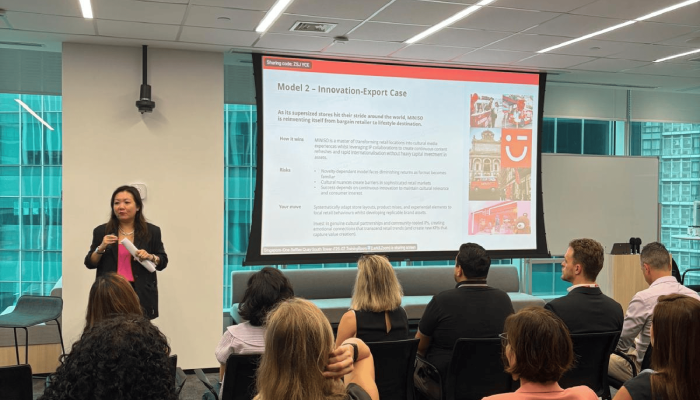Earlier this year we hosted an event at the Marina Bay Sands ArtScience museum, where executive director of the museum and TED speaker, Honor Harger, gave us an exclusive private viewing of Leonardo Da Vinci's masterpieces, which were being exhibited in Asia for the first time.
Afterwards Honor spoke about the power of long-term thinking and Marketing Society Singapore committee member Christian Oversohl wanted to delve deeper into Honor's career, so he interviewed her.
Christian: We all know about Vinci’s amazing ideas and inventions that later became a reality. Can you think of concepts and designs of today that people a few hundred years from now might consider an example of future thinking?
Honor: It’s the job of science and design fiction to come up with prototypes and physical scenarios of products and services that may exist in the future. The practice of science fiction in literature and film, and design fiction in technology and the sphere of design, is to challenge our perceptions about what society is looking like now and how it might evolve.
There are so many examples of these today. Any design studio is full of prototypes for scenarios that may exist in the future. In the work of high profile technology innovators like Elon Musk, one of the interesting things about his practice is putting out prototypes of an idea for testing. Famously, this is what happened with the Hyperloop. Perhaps we’ll look back in a few decades’ time and see some of these concepts being implemented. I personally keep a very close eye on science and design fiction, where near-future themes may be emerging.
C: Speaking of science fiction, one big dream of mankind is to live in space. That’s certainly an example of long-term thinking. Do you think this is an attainable dream?
H: There’s been a lot of back and forth with this subject. It was a major theme of science fiction in the 1960s and '70s, and it really influences NASA’s work of planning to raise habitats that humans could utilise in space. NASA's thinking was to have giant space stations instead of little shoeboxes for people to live in. We saw an example of this in the film Elysium a couple of years ago that came directly out of the concept work that NASA was doing in the 1970s.
There’s a romantic allure of establishing space colonies, and someone like Elon Musk will say that it’s a sensible backup plan if something (bad) happens to Earth. There is a lot of value to ensure that our own planet is habitable for people going forward, which might mean reworking areas that’s not been looked into yet.
C: Our lives are very different now. We’re generally trained not so much to look into the future, but to look at short-term prospects, like short-term optimization, sales and targets. What would be your advice to marketers? How can they use the power of long-term thinking to better themselves, or even the industry?
H: Different businesses will handle this differently. The focus that we as businesses and as people have on short-term thinking can lead up to short-term advantages and revenue targets, but what we might me missing out on is the development of more resilient businesses that can survive multiple challenges that rely on mid and long-term thinking. The more visionary businesses of today realise that thinking in the long term is an important aspect of their basic survival tactics.
Larry Page, CEO and co-founder of Google, has started talking about Google in a twenty to thirty year scale and insists on this kind of long-term thinking. He believes that 2 or 3 year planning for a business can limit the scope of what the company might be capable of achieving. Thinking in the long term can bring about different kinds of creative possibilities. There’s a real advantage for businesses to try and do both in parallel.
See photos from this amazing event on our facebook page.
Become a Marketing Society Asia member
If you're a senior marketer with seven years' management experience, interested in meeting inspiring people, sharing ideas and helping to drive the marketing industry in Asia, then apply for membership. To find out more please contact Lesley Olejnik.


